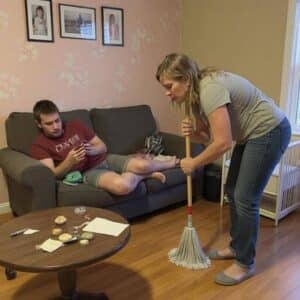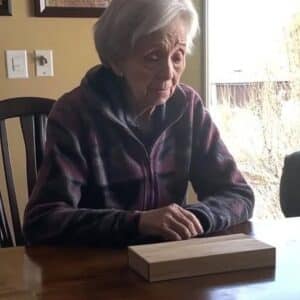The evening sun was still warm on our backs when we arrived at Melissa’s family’s Fourth of July barbecue. I could barely believe we’d made it to this point—after all those years of heartbreak, hospital visits, therapy appointments, and the long, slow climb out of the darkness, Lily was here. At fifteen, she was braver than I had ever been in my life.
Three years earlier, she’d shattered a mirror because she couldn’t bear to look at the scar slicing across her forehead. Now, here she was in a light blue summer dress, her hair pinned back, scar exposed for the world to see.
When I asked her if she was sure, she just looked at me in the mirror and said, “I’m tired of hiding.”
I thought I knew what pride was. I was wrong. That was pride.
At first, the afternoon unfolded beautifully. Lily sat a little stiff, but Melissa’s younger cousins engaged her in conversation. She even laughed. The air was light with barbecue smoke and soft laughter, and I let myself believe maybe we were really turning a corner.
Then Melissa’s mother opened her mouth.
She leaned toward Lily with a sugary smile so fake it could rot your teeth and said, “Sweetie, what happened there? That must’ve been so traumatic for you.”
I froze. Lily’s fork paused mid-air.
Before I could intervene, she continued. “Do people stare a lot? I imagine it’s hard for them not to. That’s just human nature, right?”
I stood up halfway. But she wasn’t done.
“You’re not planning to show that in the wedding photos, are you? It might… distract from the bride.”
Silence.
Lily didn’t speak. Melissa didn’t speak. I looked at her—my fiancée—expecting her to shut it down. But she just sipped her wine, eyes down.
That silence was louder than any insult.
I turned to Lily and whispered, “You wanna leave, baby?”
“Yeah,” she said softly, and then, firmer: “But first I want to say something.”
She stood, slow and deliberate. And I swear the temperature dropped.
“If we’re editing out things that make people uncomfortable,” she said, her voice like glass, “can we Photoshop out your extra 20 pounds? Personally, they ruin the aesthetic for me.”
The table fell into stunned silence. Melissa’s mother turned red. Someone dropped their fork. I fought the urge to applaud.
“You little brat!” Melissa’s mom gasped.
“I learned it from you,” Lily said with a shrug.
I stood beside her, my chest full of fire and pride, and we walked away without a backward glance.
Melissa chased us down on the front porch, demanding Lily apologize.
“She was joking,” she snapped. “You overreacted.”
I looked her dead in the eye. “Jokes are supposed to be funny.”
And with that, Lily and I left. Not just the party, but the whole illusion.
Later that night, Melissa called to say we’d ruined everything. That if Lily was still “so sensitive,” maybe she wasn’t ready for blended family life. She blamed a teenager for standing up for herself. For having boundaries. For not smiling while being humiliated.
I didn’t argue.
I just told her, “If you can’t stand up for my daughter when it counts, there’s no future here.”
I hung up. My hands were steady. My heart wasn’t.
But I looked into Lily’s room before bed, saw her asleep with the window open and moonlight on her scar, and I knew we’d done the right thing.
She wasn’t hiding anymore.
And I wasn’t going to let anyone dim her light again—especially not someone who thought love was conditional on erasing who you are.





